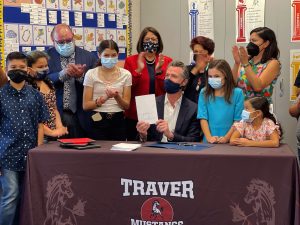$6 billion investment to expand broadband infrastructure and enhance internet access for unserved and underserved communities
Part of comprehensive California Comeback Plan to accelerate the state’s recovery and address our most persistent challenges
TRAVER – At a rural elementary school in Tulare County, Governor Gavin Newsom today signed legislation to advance the state’s commitment to bridging the digital divide by increasing equitable, affordable access to high-speed internet service across California. Through a $6 billion multi-year investment, more Californians will be able to access broadband coverage with the construction of a state-owned open access middle mile network and last mile projects that connect unserved households and businesses with local networks.
“As we work to build California back stronger than before, the state is committed to addressing the challenges laid bare by the pandemic, including the digital divide holding back too many communities in a state renowned for its pioneering technology and innovation economy,” said Governor Newsom. “This $6 billion investment will make broadband more accessible than ever before, expanding opportunity across the spectrum for students, families and businesses – from enhanced educational supports to job opportunities to health care and other essential services. I thank the Legislature for its partnership on this critically important step to ensuring that California’s economic recovery will leave no part of our state behind.”
Governor Newsom signed SB 156 at Traver Joint Elementary, a school serving diverse students in a rural Tulare County community. The school has distributed hotspot devices to students for internet access as part of the state’s cross-sector efforts launched during the pandemic.

Governor Newsom signs $6 billion broadband legislation.
The historic legislation, announced last week in partnership with legislative leaders, advances the statewide broadband plan with expanded infrastructure prioritizing unserved and underserved areas. The legislation includes:
- $3.25 billion to build, operate and maintain an open access, state-owned middle mile network – high-capacity fiber lines that carry large amounts of data at higher speeds over longer distances between local networks.
- $2 billion to set up last-mile broadband connections that will connect homes and businesses with local networks. The legislation expedites project deployment and enables Tribes and local governments to access this funding.
- $750 million for a loan loss reserve fund to bolster the ability of local governments and nonprofits to secure financing for broadband infrastructure.
- Creation of a broadband czar position at the California Department of Technology, and a broadband advisory committee with representatives from across state government and members appointed by the Legislature.
Last year, the state mobilized companies, business leaders and philanthropists through public-private partnerships to facilitate distance learning at school districts in need across the state. The effort helped connect students lacking high-speed internet or an appropriate computing device at home with donated mobile hotspots, laptops, Chromebooks, tablets and other devices. The legislation signed today takes a comprehensive and long-term approach to tackling the broadband infrastructure deficiencies still impacting rural and low-income communities, bringing the state closer to achieving affordable, high-speed broadband internet service for all communities.
For the full text of the bill, visit: http://leginfo.legislature.ca.gov
###

